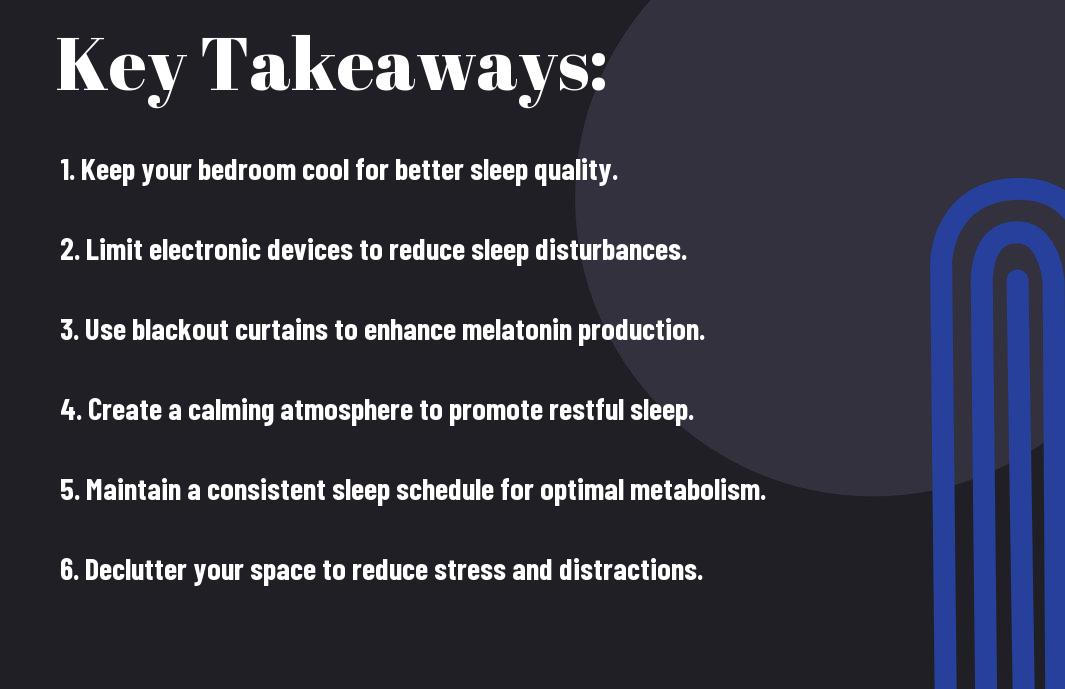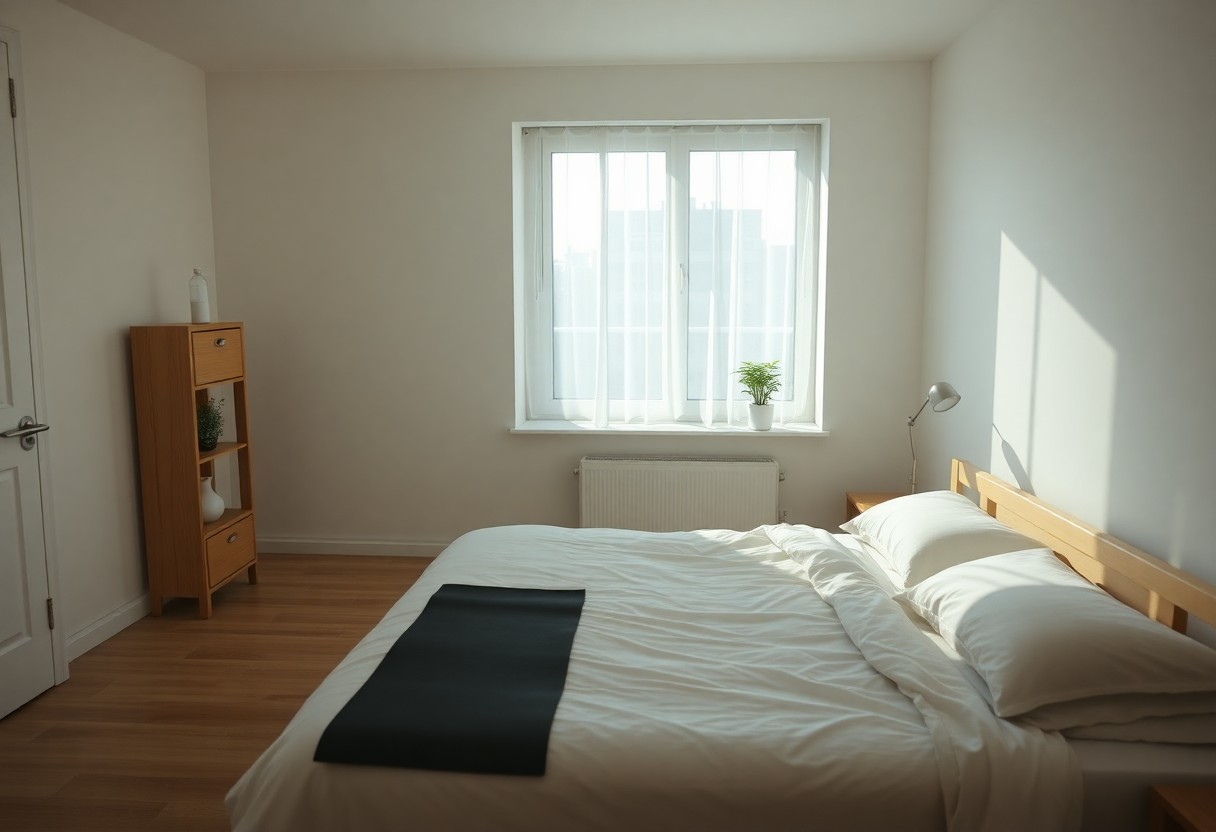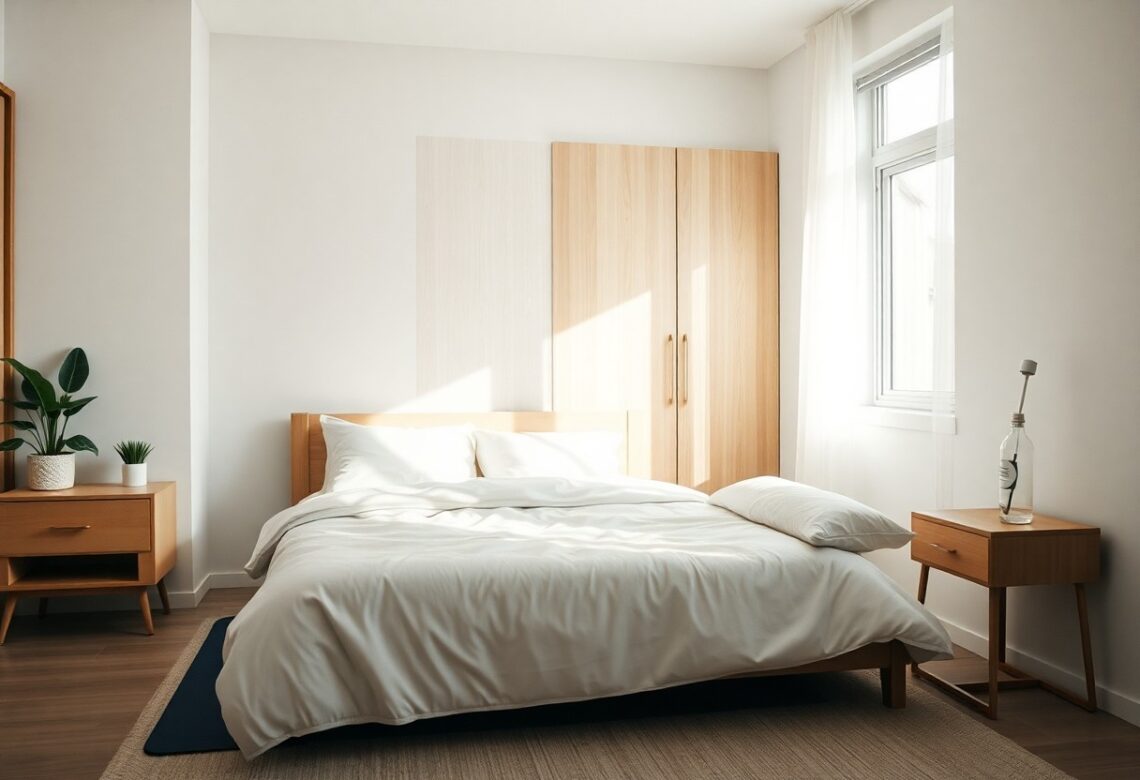You can transform your bedroom into a supportive environment for weight loss by making simple adjustments that promote better sleep and healthier habits. Your sleep space plays a vital role in regulating your body’s metabolism and hormones. By focusing on factors such as lighting, temperature, and organization, you can create a sanctuary that not only improves your quality of rest but also enhances your weight loss journey. In this post, we’ll explore effective strategies to optimize your bedroom for a healthier lifestyle.
Key Takeaways:
- Lighting: Use soft, dim lights to signal the body it’s time to wind down, promoting better sleep hygiene and aiding metabolism.
- Temperature: Keep the bedroom cool, ideally between 60-67°F, as a lower temperature can boost fat-burning hormone production.
- Clutter-Free Space: Maintain an organized bedroom to reduce stress, which can contribute to weight gain through the release of cortisol.
- Comfortable Bedding: Invest in a good mattress and pillows to ensure quality sleep; lack of sleep can lead to weight gain.
- Limit Electronics: Reduce the presence of screens in the bedroom to improve sleep quality and decrease nighttime snacking.
- Aromatherapy: Incorporate calming scents like lavender to promote relaxation and better sleep, aiding weight loss efforts.
- Positive Decor: Use motivational artwork and colors that promote calmness and inspiration, creating an encouraging environment for health goals.

The Science of Sleep and Weight Loss
Before venturing into optimizing your bedroom for weight loss, it’s imperative to understand the integral connection between sleep and your body’s ability to shed pounds. Quality sleep not only rejuvenates you but also influences your metabolism and appetite. When you sleep well, you set the stage for balanced hormones and improved fat-burning mechanisms, ultimately aiding your weight loss journey.
Understanding Sleep Cycles
Loss of sleep can disrupt your natural sleep cycles, which consist of various stages including REM and deep sleep. Each stage plays a vital role in restoring your body and regulating your metabolism. When these cycles are interrupted, your body may struggle to recover properly. By prioritizing restorative sleep, you can enhance your overall health and support effective weight loss.
The Role of Hormones in Sleep and Metabolism
Above all, hormones have a significant impact on how your body regulates sleep and metabolism. When you’re sleep-deprived, your body tends to produce more of the hunger hormone ghrelin and less of the satiety hormone leptin. This imbalance can lead to increased cravings and poor food choices, making it harder to achieve your weight loss goals.
Weight management is closely tied to the levels of hormones produced during your sleep. Disrupted sleep affects cortisol and insulin levels, leading to heightened stress and poor blood sugar control. When you ensure quality sleep, you promote a healthier hormonal balance, which can help you control your appetite and metabolism more effectively. By optimizing your sleep environment, you pave the way for better hormonal regulation and enhanced weight loss efforts.


Designing a Sleep-Friendly Environment
Now that you understand the significance of sleep in your weight loss journey, it’s time to create a space that promotes restful slumber. Your bedroom should be a sanctuary for sleep; it should be dark, quiet, and cool. You can dive deeper into the connection between sleep and weight loss by checking out this article on Sleep & Weight Loss: Do You Lose Weight Overnight?.
Ideal Bedroom Temperature and Lighting
An ideal sleep environment balances temperature and lighting to foster relaxation. Below is a quick guide to help you set these elements perfectly for restful sleep:
| Temperature Range | 60-67°F (15-19°C) |
| Lighting Conditions | Dark or low-light, use blackout curtains |
| Sleep Gadgets | Use a white noise machine or eye mask |
Decluttering for Better Sleep Quality
For enhancing your sleep quality, decluttering your bedroom is a smart step. A tidy space not only reduces distractions but also promotes a peaceful mindset conducive to sleep.
Ideal decluttering involves removing unnecessary items that may create visual chaos. Ensure your bedroom features only items that help you relax, like calming artwork or cozy textiles. Regularly tidy up to create a calming atmosphere, which can enhance your sleep quality and indirectly support your weight loss efforts by promoting restorative rest. A serene sleep environment can help regulate your body’s metabolism and cortisol levels, important for your weight management goals.
Choosing the Right Bedding
Keep in mind that your bedding plays a significant role in creating a sleep environment that supports weight loss. Selecting materials that are breathable and comfortable can improve your sleep quality, which is imperative for regulating metabolism and reducing cravings. Look for bedding that promotes temperature control and feels good against your skin to create an inviting space that encourages restorative rest.
Importance of Mattress Quality
At the core of a good night’s sleep is your mattress. A high-quality mattress not only contributes to better sleep posture but also supports your body’s alignment, which is vital for restorative sleep. When your body is well-supported, you will experience improved sleep quality, leading to enhanced metabolism and weight management. Invest in a mattress that suits your comfort preferences, as this can lead to longer, uninterrupted sleep cycles.
Selecting Appropriate Pillows
Before choosing pillows, consider how they can affect your overall sleep quality. Pillows should provide adequate support for your neck and head, ensuring proper spinal alignment. This can aid in reducing discomfort and promoting better sleep, which is imperative for maintaining a healthy metabolism and supporting your weight loss goals.
Right pillow selection is about finding one that complements your sleep position. If you are a side sleeper, a firmer, thicker pillow may be necessary to bridge the gap between your shoulder and head, while back sleepers might prefer a medium loft for balanced support. For stomach sleepers, a soft, thinner pillow can help prevent neck strain. By choosing pillows that align with your preferred sleep position, you can enhance your overall sleep quality and contribute to your weight loss efforts.
Incorporating Technology Wisely
Unlike the notion that technology can hinder your weight loss journey, it can actually enhance your environment when used thoughtfully. By exploring resources such as Optimizing Sleep for Weight Loss: Insights & Strategies, you can leverage the power of tech to aid in achieving your wellness goals.
Limiting Screen Time Before Bed
Technology can significantly impact your sleep quality. Limiting your screen time at least an hour before bedtime allows your brain to unwind, promoting more restful sleep. Blue light emitted by devices can disrupt your circadian rhythm, making it difficult for you to fall asleep. Consider establishing a relaxing bedtime routine that excludes screens to improve your overall sleep quality.
Utilizing Sleep Tracking Apps
Screen tracking tools can provide valuable insights into your sleep patterns. By utilizing sleep tracking apps, you gain awareness of your habits, including the duration and quality of your rest. This knowledge enables you to make informed adjustments that can contribute to better weight management.
A good sleep tracking app provides detailed data on your sleep cycles and can help identify factors that affect your sleep quality. You might find that certain behaviors, like late-night snacking or inconsistent bedtimes, are impacting your progress. By analyzing your sleep data, you can implement more effective strategies tailored to your needs, ultimately contributing to your weight loss efforts.
Establishing a Healthy Bedtime Routine
Not prioritizing a consistent bedtime routine may hinder your weight loss goals. Creating a calming nightly habit signals to your body that it’s time to rest, which can improve the quality of your sleep and support your metabolic health. By incorporating relaxing activities and sticking to a sleeping schedule, you create an environment conducive to weight loss and overall well-being.
Techniques for Relaxation and Wind Down
Between the chaos of daily life and the consistent lure of screens, it’s vital to carve out time for relaxation before bed. Techniques such as reading a book, practicing meditation, or engaging in gentle yoga can help you unwind. These activities can soothe your mind and prepare your body for restful sleep, ultimately aiding your weight loss journey.
The Importance of Consistent Sleep Schedule
For achieving optimal health and supporting weight loss efforts, a consistent sleep schedule is vital. Going to bed and waking up at the same time every day helps regulate your body’s internal clock, enhancing the quality of your sleep and maximizing the efficiency of your metabolism. This consistency can foster balanced hormone levels, which directly impact hunger cues and energy expenditure.
Schedule your bedtime and wake time like an important appointment. By maintaining this rhythm, you reinforce your body’s natural circadian rhythm, which aids in deeper sleep phases and recovery. This not only supports weight management but also improves your mood and energy levels throughout the day. Establishing this routine can be one of the most effective strategies for long-term weight loss success.

Nutrition’s Impact on Sleep and Weight
All aspects of nutrition can significantly influence your sleep quality and weight management. Consuming a balanced diet rich in nutrients can enhance sleep patterns, which, in turn, may help you shed those extra pounds. For more insights, check out 6 Ways Sleep May Help You Lose Weight. Ensuring that your meals align with your sleep goals is a key component of optimizing your bedroom and overall health.
Best Foods to Promote Sleep
Foods that promote restful sleep include those rich in magnesium, tryptophan, and melatonin. Consider incorporating almonds, bananas, turkey, and oatmeal into your evening snack routine. These foods can help signal your body that it’s time to wind down, ultimately enhancing the quality of your sleep and supporting weight loss efforts.
Foods to Avoid Before Bedtime
With the right foods assisting your sleep, it’s equally important to identify those that may disrupt it. Steer clear of heavy, rich meals, caffeine, and alcohol close to bedtime. These items can interfere with your ability to fall asleep and stay asleep, making it harder to maintain a healthy weight.
Another category to avoid includes sugary snacks and high-carb meals. Consuming these before bed can spike your blood sugar levels, leading to restless nights and increased cravings the following day. Prioritizing a balanced evening snack can make a significant difference in ensuring the quality of your sleep and supporting your weight management efforts.
Final Words
As a reminder, optimizing your bedroom for weight loss involves creating an environment that promotes quality sleep, reduces distractions, and encourages healthy habits. Ensure your bedroom is dark, quiet, and cool to enhance your sleep quality, and consider organizing the space to minimize clutter. Additionally, removing electronic devices can help limit distractions that affect your sleep and overall well-being. By prioritizing a restful atmosphere, you can support your weight loss journey effectively and achieve your fitness goals more efficiently.
FAQ
Q: How does my bedroom environment impact my weight loss efforts?
A: Your bedroom environment can significantly affect your sleep quality, which in turn influences weight loss. A clutter-free, calming space promotes better sleep, leading to hormonal balance and weight management. Additionally, a comfortable mattress and favorable room temperature can enhance your rest, making it easier for your body to shed excess pounds.
Q: What role does sleep play in weight loss?
A: Adequate sleep is crucial for weight management. Lack of sleep can lead to increased hunger hormones, cravings for unhealthy foods, and reduced metabolism. Getting 7-9 hours of quality sleep each night supports healthy cortisol levels and overall metabolism, which facilitates weight loss efforts.
Q: Should I keep my bedroom technology-free for better weight loss?
A: Yes, reducing technology usage in your bedroom can enhance sleep quality and promote relaxation. The blue light emitted from screens can interfere with melatonin production, making it harder to fall asleep. Establishing a tech-free zone encourages better sleep hygiene, which is beneficial for weight maintenance and loss.
Q: How can I use colors in my bedroom to support my weight loss goals?
A: Color psychology suggests that certain colors can influence mood and behavior. Soft, calming colors like blues and greens can create a relaxing atmosphere conducive to sleep, while vibrant colors like red and yellow might stimulate appetite. Opting for muted, cooler tones can promote a soothing environment that supports weight loss through improved rest.
Q: What types of bedding can support weight loss?
A: Choosing breathable, comfortable bedding can enhance your sleep quality. Natural materials like cotton and linen allow for better air circulation and moisture-wicking, ensuring a cooler night’s sleep. Being comfortable helps to optimize hormonal balance and supports your overall health, aiding your weight loss journey.
Q: Are there specific scents I can use in my bedroom that aid in weight loss?
A: Certain scents can promote relaxation and better sleep, indirectly supporting weight loss. Essential oils such as lavender and chamomile are known for their calming properties. Aromatherapy using these scents can help reduce stress levels and improve sleep quality, which is beneficial for maintaining a healthy weight.
Q: How important is room temperature for my weight loss journey?
A: The temperature of your bedroom plays a significant role in your sleep quality. A cooler room, ideally between 60-67°F (15-19°C), can enhance sleep by allowing the body to lower its core temperature, promoting deeper sleep. Improved sleep contributes positively to metabolism and weight management, aiding your weight loss efforts.





